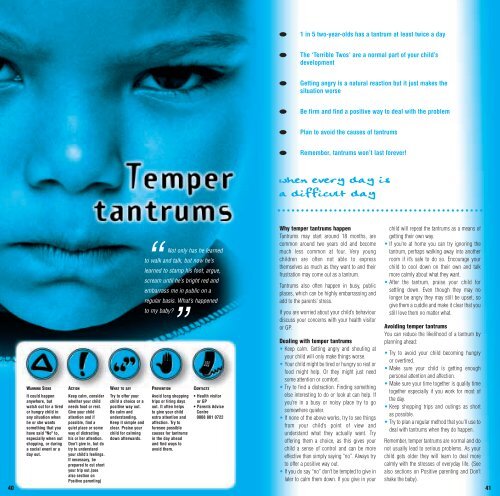Safe Parenting Handbook (PDF 1.07 Mb) - Department of Health ...
Safe Parenting Handbook (PDF 1.07 Mb) - Department of Health ...
Safe Parenting Handbook (PDF 1.07 Mb) - Department of Health ...
- No tags were found...
You also want an ePaper? Increase the reach of your titles
YUMPU automatically turns print PDFs into web optimized ePapers that Google loves.
WARNING SIGNS1 in 5 two-year-olds has a tantrum at least twice a dayThe ‘Terrible Twos’ are a normal part <strong>of</strong> your child’sdevelopmentGetting angry is a natural reaction but it just makes thesituation worseBe firm and find a positive way to deal with the problemPlan to avoid the causes <strong>of</strong> tantrumsRemember, tantrums won’t last forever!when every day isa difficult day40It could happenanywhere, butwatch out for a tiredor hungry child inany situation whenhe or she wantssomething that youhave said "No" to,especially when outshopping, or duringa social event or aday out.ACTIONKeep calm, considerwhether your childneeds food or rest.Give your childattention and ifpossible, find aquiet place or someway <strong>of</strong> distractinghis or her attention.Don’t give in, but dotry to understandyour child’s feelings.If necessary, beprepared to cut shortyour trip out.(seealso section onPositive parenting)“Not only has he learnedto walk and talk, but now he’slearned to stamp his foot, argue,scream until he’s bright red andembarrass me in public on aregular basis. What’s happenedto my baby?”WHAT TO SAY PREVENTION CONTACTSTry to <strong>of</strong>fer your Avoid long shopping • <strong>Health</strong> visitorchild a choice or a trips or tiring days or GPpositive way out. out. It <strong>of</strong>ten helps • Parents AdviceBe calm and to give your child Centreunderstanding. extra attention and 0808 801 0722Keep it simple and affection. Try toclear. Praise your foresee possiblechild for calming causes for tantrumsdown afterwards. in the day aheadand find ways toavoid them.Why temper tantrums happenTantrums may start around 18 months, arecommon around two years old and becomemuch less common at four. Very youngchildren are <strong>of</strong>ten not able to expressthemselves as much as they want to and theirfrustration may come out as a tantrum.Tantrums also <strong>of</strong>ten happen in busy, publicplaces, which can be highly embarrassing andadd to the parents’ stress.If you are worried about your child’s behaviourdiscuss your concerns with your health visitoror GP.Dealing with temper tantrums• Keep calm. Getting angry and shouting atyour child will only make things worse.• Your child might be tired or hungry so rest orfood might help. Or they might just needsome attention or comfort.• Try to find a distraction. Finding somethingelse interesting to do or look at can help. Ifyou’re in a busy or noisy place try to gosomewhere quieter.• If none <strong>of</strong> the above works, try to see thingsfrom your child’s point <strong>of</strong> view andunderstand what they actually want. Try<strong>of</strong>fering them a choice, as this gives yourchild a sense <strong>of</strong> control and can be moreeffective than simply saying “no”. Always tryto <strong>of</strong>fer a positive way out.• If you do say “no” don’t be tempted to give inlater to calm them down. If you give in yourchild will repeat the tantrums as a means <strong>of</strong>getting their own way.• If you’re at home you can try ignoring thetantrum, perhaps walking away into anotherroom if it’s safe to do so. Encourage yourchild to cool down on their own and talkmore calmly about what they want.• After the tantrum, praise your child forsettling down. Even though they may nolonger be angry they may still be upset, sogive them a cuddle and make it clear that youstill love them no matter what.Avoiding temper tantrumsYou can reduce the likelihood <strong>of</strong> a tantrum byplanning ahead:• Try to avoid your child becoming hungryor overtired.• Make sure your child is getting enoughpersonal attention and affection.• Make sure your time together is quality timetogether especially if you work for most <strong>of</strong>the day.• Keep shopping trips and outings as shortas possible.• Try to plan a regular method that you’ll use todeal with tantrums when they do happen.Remember, temper tantrums are normal and donot usually lead to serious problems. As yourchild gets older they will learn to deal morecalmly with the stresses <strong>of</strong> everyday life. (Seealso sections on Positive parenting and Don’tshake the baby).41






